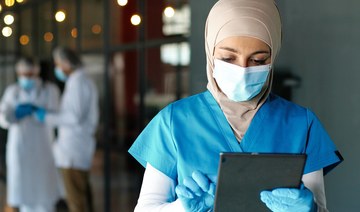RIYADH: Cyclists got on their bikes to mark World Diabetes Day in Riyadh’s Diplomatic Quarter on Saturday.
Saudi Arabia joined the global campaign on Nov. 14 to foster awareness of how exercise and diet can combat the disease in the local community.
The Embassy of Denmark, in collaboration with the Saudi Ministry of Sports, Danish pharmaceutical company Novo Nordisk and the Diplomatic Quarter General Authority, organized a week-long cycling event to commemorate the occasion.
The Saudi Ministry of Health participated in the event in which 50 cyclists took part, including staff from the Embassy of Denmark, the Health Ministry, Novo Nordisk and members of Wesaya, a professional bicycle club in Riyadh.
Led by Denmark Ambassador Ole E. Moesby, a group of male and female cyclists covered a distance of 12 km inside the DQ area.
Speaking to Arab News, the Danish ambassador said: “On this day we focus a lot on people who are suffering from diabetes. An increasing part of the population is suffering from it but many of them don’t know that they are diabetic, so our objective is to increase awareness to all society segments to put diabetes under check.”
“If you take the number of people who are suffering from diabetes in Saudi Arabia, it’s a large part of the population and we need to make sure that they are doing things in such a way that it does not get severe for them,” Moesby said.
“You also have to have a health care system which is able to help them, and that’s what we are here for,” the envoy said.
HIGHLIGHT
The theme for World Diabetes Day 2020 is ‘The Nurse and Diabetes.’
Speaking to Arab News, Wesaya captain, Alaa Hossain Jamalalail, said: “We started the group in 2018 to share the experience of using the bicycle inside Riyadh and its health benefits — people can protect themselves better from diseases such as diabetes.”
“Bicycle rides are so easy and very helpful to stay fit. It can be used by kids, youth and older people; this is the beauty of this sport,” Jamalalail said.
On professional cycling and encouraging athletes to join international competitions, Jamalalail said that more young people were coming to the club.
“In the coming five years, I believe Saudi Arabia will have two or three athletes in the international arena,” he said.
Hany Rezk, business unit director at Novo Nordisk, told Arab News: “Our objective is to share updates and information about it with people, tell them how important is it to control blood sugar and foster awareness with an educational campaign.”
World Diabetes Day was created in 1991 by the International Diabetes Federation. It was recognized by the UN in 2006 as the day marks the birthday of Sir Frederick Banting, the scientist and Nobel laureate who discovered insulin alongside colleague Charles Best in 1922.




































